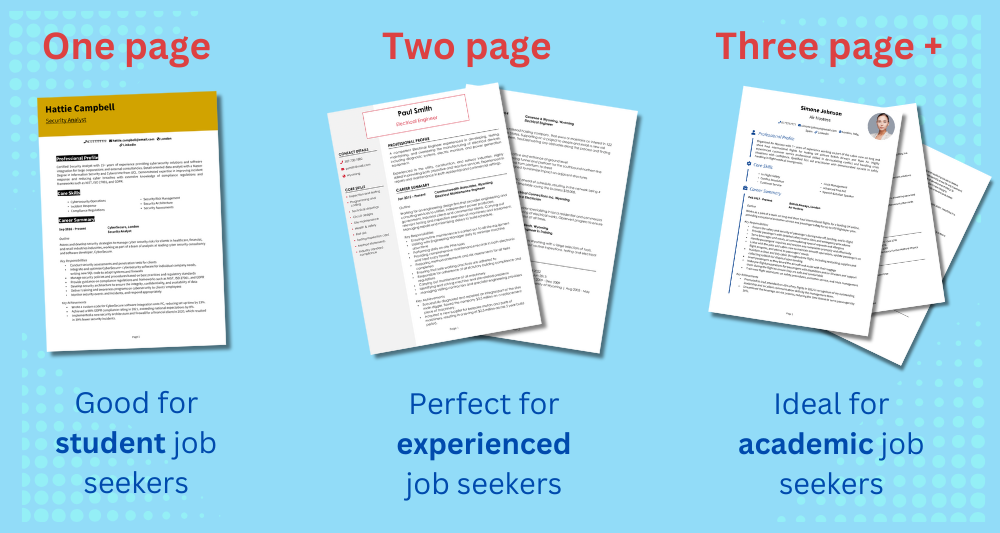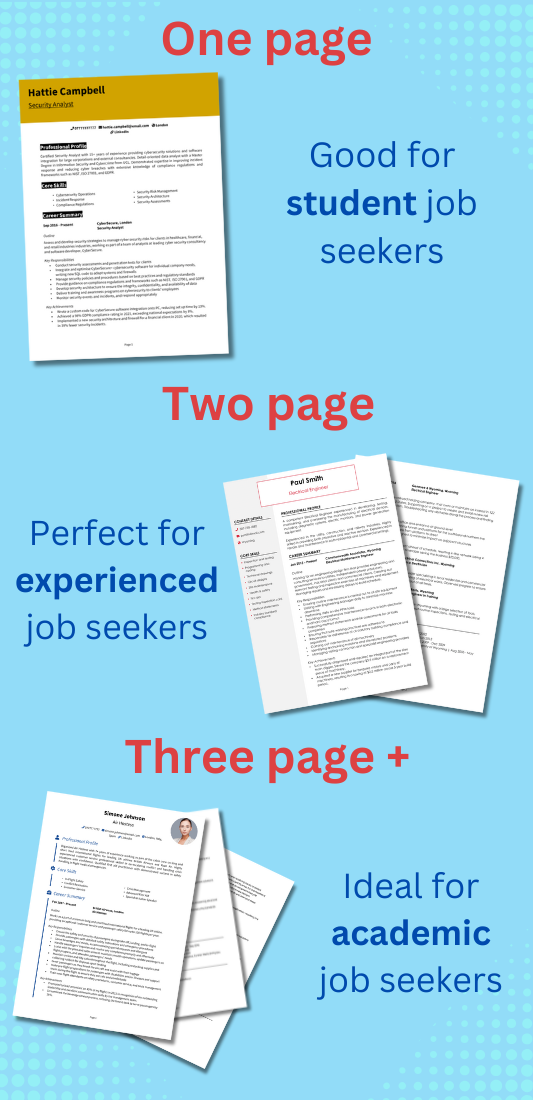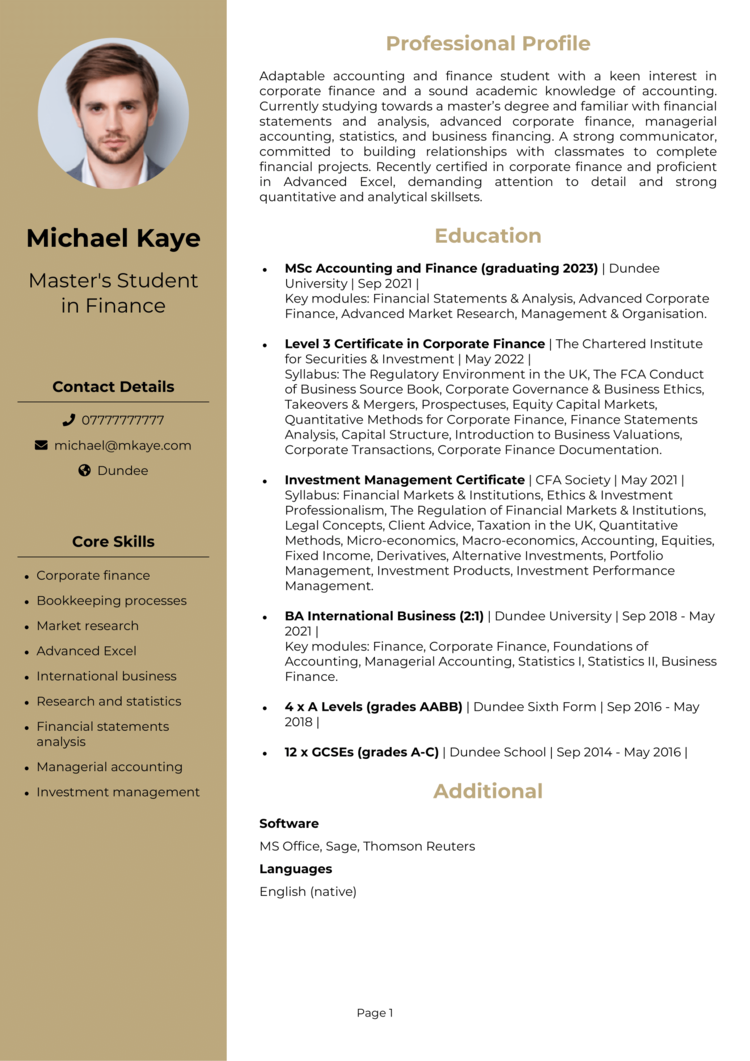That’s why CV length matters more than most candidates realise.
If your CV drags on, I won’t finish it.
If it’s too light, I’ll move on.
Some candidates sent me a novel, while others barely filled half a page. Both made the same error: they didn’t give me the right amount of information to judge them fairly.
The reality is, there’s a sweet spot when it comes to CV length. Enough detail to prove your value, but short enough to keep a recruiter’s attention.


One page CV
Best for junior job seekers and students
A one-page CV is perfect for those just starting out – think graduates, school leavers, or entry-level jobs. This is because a single page is just enough space to include a profile and detail your academic history and qualifications, with enough room for a couple of jobs.
The biggest perk? A single-page CV is quick and easy for busy recruiters to read. You’re catering to a recruiter’s low attention span, and you’ll ensure that they can absorb your most relevant skills and achievements at a glance.
Make every line count, using action verbs and numbers to emphasise the significance of each of your past duties.
However, the shorter format can feel restrictive, especially for those with more experience, as it risks leaving out important details. Striking the right balance between brevity and detail is critical, as oversimplifying your experience could make your application seem flimsy.
One page CV template

Two page CV
Perfect for experienced job seekers
A two-page CV is the sweet spot for most professional job seekers in the UK. It gives you enough room to fully showcase your skills, work experience, and achievements without overwhelming or boring recruiters. It tells your story, without turning it into a novel.
Two pages are enough for a compelling professional profile, along with a detailed job history and a small education section.
Done well, a two-page CV provides the best of both worlds: depth and clarity, giving you the space to shine while respecting the recruiters’ time. It should look like the below example.
But here’s the catch: having more space can be a double-edged sword. It’s easy to include too much information and risk losing the recruiter’s attention. The trick? Focus on what’s most relevant to the jobs and avoid unnecessary detail (more on that later).
Writing a CV of this length also requires clear organisation. With more content to include, formatting becomes critical to ensure it’s easy to read and flows logically.
Two page CV template


How to cut down a CV
Struggling to fit your CV into the ideal 1-2 pages? Don’t worry – you’re not alone. The trick isn’t cramming in every detail; it’s making recruiters focus on what matters.
Here’s some tips to polish your CV without losing impact:
- Adjust your page formatting – Reduce the font size slightly (but no less than 10pt!), narrow the margins, decrease line spacing, and cut out some white space from your CV structure.
- Shorten old roles – Especially if they’re less relevant to the jobs you’re after, simply listing your job title and dates of employment, with a short outline at most, will suffice.
- Remove even older roles – Jobs from over a decade ago likely aren’t pertinent to your current career goals: it’s okay to cut out very outdated jobs. Or, alternatively, batch them together: for example, “Various retail positions”, and only summarise the key skills and responsibilities if they’re relevant.
- Drop irrelevant content – Unrelated hobbies, outdated certifications, and minor responsibilities won’t improve your job prospects: get rid of them.
- Avoid repetition – There’s no real need to repeat similar skills or achievements across different roles – mentioning them once is enough to prove your expertise.
- Keep it focused – You typically won’t need to list more than 8 key responsibilities or 3 key achievements for a job.
- Leave out references – Recruiters in the UK won’t (and shouldn’t) contact your referees at this point in the hiring process, so there’s no need to include them.


How far back should a CV go?
Your CV should focus on the last 10 years of your career when applying for roles in the UK. Beyond that, it’s best to summarise older roles or leave out anything irrelevant to your target jobs.
Going this far back ensures your CV stays concise and highlights your most recent and valuable experience. Let’s break it down based on your career stage:
Entry-Level or Junior Professionals
You’ll want to include absolutely everything – your education, internships, part-time jobs, and any relevant volunteer work.
With limited professional experience, every bit counts, so don’t hold back on showing what you’ve done and the potential you’ve got to grow. You should detail specific relevant modules and projects completed during your degree or other qualification in the education section.
Mid-Level Professionals
Focus on the last 10 years, detailing your key roles, responsibilities, and achievements during this period.
For jobs older than that, summarise briefly – just list the job title, employer, and dates, without going into further detail unless it’s directly relevant to the role you’re applying for.
Senior-Level Professionals
Give recruiters detailed information for your last 10 years of experience, including significant achievements and leadership responsibilities.
For earlier roles, summarise quickly with a focus on relevance, or even drop them entirely – no need to dive into old, unrelated positions. Think about what recruiters are looking for.
Unsure about the perfect CV length?
Check out our CV builder—it helps you structure your content efficiently with pre-made sections across our many templates, and formatting tips to keep your CV concise and impactful.
FAQs
How long should a personal statement on a CV be?
Personal statements should be no more than 15 lines. It’s a quick overview of your career; it should be sharp and to the point.
Professional profiles, a similar summary for experienced candidates, should be no longer than 8 lines.
How long should a graduate CV be?
A graduate CV would typically be one page, but it can extend to two if you have relevant internships, part-time jobs, or extracurricular achievements to showcase. The focus should be on education, skills, and your potential.
Should a CV be one page?
Your CV doesn’t have to be one page, but it should be as concise as possible. One page works well for early-career professionals, while more experienced candidates may need two pages to cover relevant skills and achievements.
What is the ideal length for a CV?
The ideal length for a CV is 1-3 pages long, but the exact number is tailored towards your career stage.
Most candidates should aim for 2 pages, while less experienced ones can stick to 1. Some roles, like academics, may require 3 or more.



